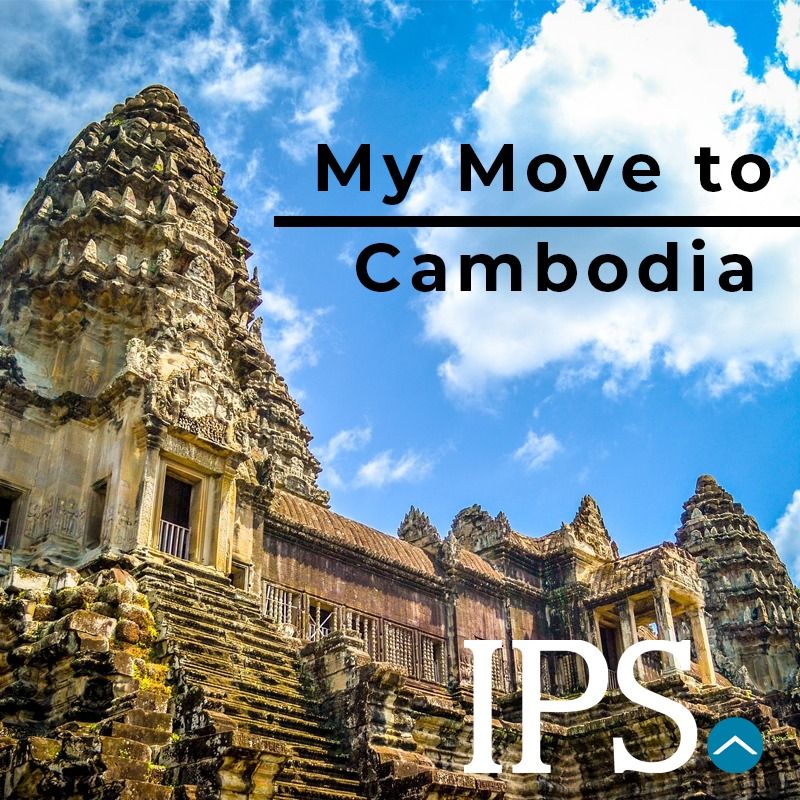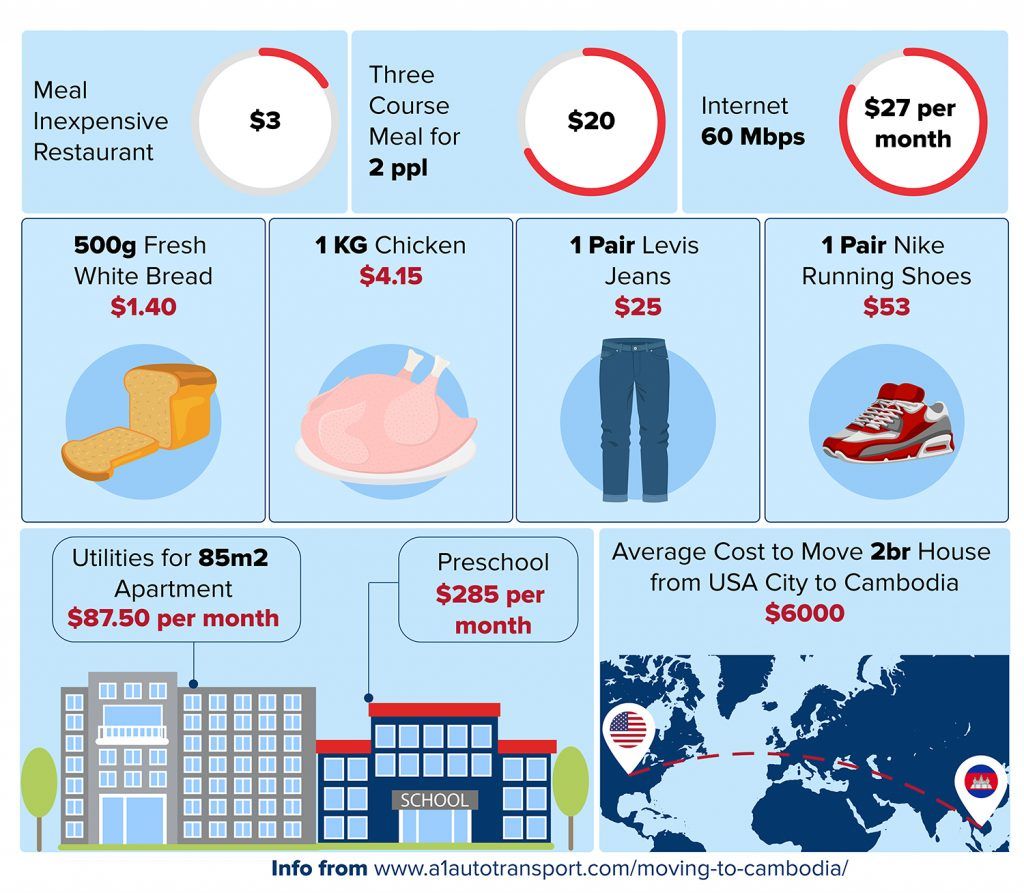Updated on Feb 16, 2024
This is it! The long-awaited opportunity to explore a new and mysterious country came. I would move to Cambodia for work and will be staying there long-term. The first thing that came to my mind is, “Where is Cambodia?”
Like any individual embarking on a new journey, I researched. There are pages and pages of articles extolling the virtues and demerits of Cambodia on the internet. I learned the country’s history, its rich culture, the hardships it had endured over the years, and where it is now in terms of economic development.
Here’s to give you a quick look of the cost of living here in Cambodia:
However, most of the information out there is contrasting. Some articles described Cambodia as a poor and undeveloped country. It gave me the impression of going to a country with 80% of the people not knowing how to speak my language, of fertile lands unspoiled by modernity and globalization. And it left me awe-struck and scared at the same time.
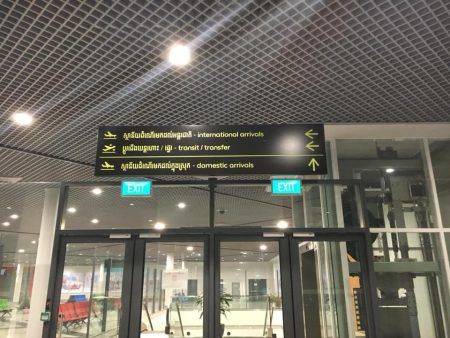
Whether permanently or for work, it’s never easy to leave family behind and settle in another country. It is harder still when you don’t know what will greet you as you step off the plane. It is both scary and exciting. Be prepared and learn the basics before your big move to Cambodia.
The Big Move to Cambodia
As far as preparation goes, it’s very straightforward. Most of the websites I visited warned of Malaria, Dengue, and many other diseases. It recommends getting the vaccines for these diseases before leaving my own country. It also warned of the bad health system and advised that I stock up on medicines that I would need, bring a bunch of conservative clothes and prepare for the long and sweltering heat of the summer season, the frustrating traffic and the hardships of not being able to communicate with the locals.
What did I do? I packed my bags, brought some money for personal expenses, and stepped on the plane. Crazy right? Actually, it’s not.
Where is Cambodia, and how do you get there?
Cambodia is a country located in the south of the Indochina Peninsula in Southeast Asia. It is land-locked by the neighboring countries of Thailand in the northwest, Laos in the northeast, Vietnam in the east and the Gulf of Thailand in the southwest.
There are a lot of travel options to choose from when going to Cambodia. The easiest would be by a plane ride. Depending on the country from where you will be coming from, and the airline service that you choose, you can reach the country via direct flight or through connecting flights with a layover in Bangkok or Kuala Lumpur.
Another option to get here is to enter the neighboring countries of Thailand, Vietnam, and Laos then travel the rest of the way to Cambodia by bus or a rented private car.
Travel and Health Insurance
Travel and Health insurance is an aspect of traveling that most of us, including me, ignore because we do not usually see the advantages of getting one. Prepare and protect yourself and your family from any unfortunate event before moving to Cambodia.
There are many countries where you can buy insurance at least a day before you depart your home country. The most popular travel insurance policy among expats is one provided by World Nomads. It is available in most states and offers a wide range of services including Overseas Medical & Dental Expenses, Medical Evacuation & Repatriation, Trip Cancellation or Interruption, 24-Hour Assistance Services, Baggage insurance and more, depending on your country of residence.
You need health insurance because hospitals in the country need payment up front. Albeit cheaper than most western countries, it will still set you back by a hundred dollars or more for simple procedures. Getting health insurance will ensure that you are covered for emergency expenses like these. The most popular providers among expats are Cigna Global, Aetna Global Benefits, and April International.
Visa Requirements
Depending on your home country, you may or may not need a tourist visa to enter Cambodia. ASEAN passport holders generally enjoy a free tourist visa with a 21-day duration. Citizens from other countries can get a visa on arrival for $35 at Siem Reap, Phnom Penh, and Sihanoukville airports as well as in the international land borders from Vietnam, Laos, and Thailand.
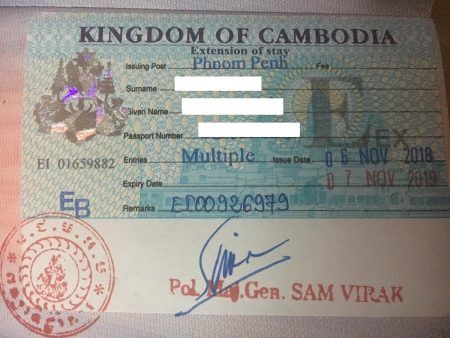
These are the other visa types that you can get depending on how long you will be staying in the country and the purpose of your visit.
Tourist T Visa
The T visa is a one-time, free 21-days duration pass for ASEAN passport holders and it’s usually just a stamp on your passport upon entry to Cambodia.
Category EG Visa
EG Visa is a green, single-entry, 30-days duration visa that the immigration official is going to paste in your passport. You can buy this type of visa in airports and land borders upon entry for $35-$50. It’s the type of visa for individuals looking for work in Cambodia.
Category EB Visa
Business Visa and comes in 3 variations. The 3-month E visa is single-entry and costs $75-$80. The 6-month multiple entry visa costs $160, and the 12-month visa costs $285-$300. Both the 6 and 12-month visas require a valid work permit and can be processed in a few days by a travel agency anywhere in the country.
Category ER Visa
ER visa is required for retirees living in Cambodia. It is valid for 12 months and does not require a work permit. However, retirees need to show proof of financial stability from their home country to obtain this visa. The price for ER Visa is the same as the 12-month EB Visa and obtained through a travel agency.
Category ES Visa
The ES Visa is explicitly issued for students and requires an official letter from the educational institution that confirms their enrolment. It can also be applied through a travel agency and priced the same as the EB Visa for 6 and 12-month duration.
Job Opportunities
Once you’ve obtained your visa, it’s now time to find a means to support yourself. Some foreigners arrive in the country with a job waiting for them already. For the others that were not lucky enough to secure employment before arriving, don’t fret. There are a lot of opportunities in Cambodia that would fit your qualifications.
The most significant job opportunity for foreigners, especially for citizens of Native English speaking countries, are teaching jobs in international schools. In the past few years, the country had an unquenching thirst to develop Cambodian’s English language skills. It opened up a lot of opportunities for foreigners who choose to stay in the country.
Teaching gigs can range from $800-$2,000 – depending on your skills, qualifications, and years of experience. Non-native speakers can also get a teaching position for roughly $500-$1,000 as well. Marketing, Real estate, Tourism, and Web-Development are other sectors ripe in opportunities for foreigners.
Although the salary doesn’t seem very high, the low cost of living in Cambodia makes it possible for an individual to live comfortably in the country for $1,500 or less.
Moving around: Modes of Transportation
A few years ago, traveling around the country can be quite tricky and dangerous. There is no reliable public transport system except for tuk-tuk and moto for short trips around a specific province. These type of transportation can be expensive and requires the right amount of negotiation skills. Buses, on the other hand, provide transport only from a province to another province.
Traveling by Metered Tuk-tuk and Cars
Nowadays, there is an influx of transport services available – most of them with available mobile apps that allow you to arrange for transportation, without the need to haggle for the fare and with just a swipe on your mobile device.
Grab App
Perhaps the most common is the Grab App, which became more popular in Southeast Asia after it bought Uber. This app is usually just from point to point, and drivers rarely allow passengers to stop over to pick up or purchase something unless you specify during booking that you have two stops. Choice includes:
- GrabTuktuk for 1-3 passengers
- Grab Remorque for 4-6 passengers
- Grab Moto is available if you are adventurous and want to travel at the back of the driver.
- Just Grab for those who want to travel by car
- Grab SUV for a larger group that cannot fit in a regular car
PassApp Taxi
PassApp Taxi offers the same kind of services like Grab. Cars, tuk-tuk, and SUV are easily hailed thru its app, but unlike grab, it is more of a metered tuk-tuk service. You can have as many stop-overs as you want, as long as you pay for the full meter.
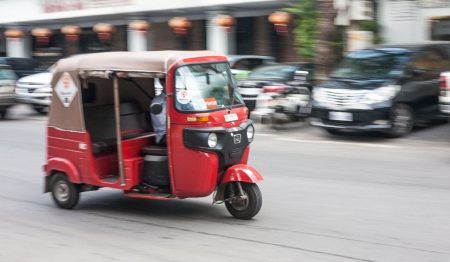
Other Transport Services
There are different, less famous, types of transportation that you can use to go around the country. Below is the list of the other transport services available:
Ez Go – the oldest mobile transport service that is exclusively offering metered tuk-tuks.
Exnet Taxi – a little more expensive choice if you want to travel by regular taxi or SUV. It has a flag-down rate of 6,000 riels for regular cab and 7,800 riels for SUV. A 30% surcharge is also applicable for peak hours.
iTsumo – youngest and cheapest transport service and offers tuk-tuk service for a minimum charge of 4,600 KHR and 1,920 KHR for every kilometer.
Global Taxi – is the biggest and oldest metered taxi service specific only to Phnom Penh. It has a fleet of more than 200 cars and is operational 24/7.
Choice Taxi – another metered taxi service and characterized by the yellow color of their fleet. Like Global Taxi, this company is also available only in Phnom Penh
Great Wall Taxi – are blue taxis roaming around the streets of Phnom Penh that offers 2,500 KHR rides for every kilometer.
City Bus – There is also now a city bus that travels around Phnom Penh that costs 1,500 KHR one-way.
Where to Stay: Expat Friendly Areas in Cambodia
Many areas in Cambodia would suit any lifestyle. For expats working in the country, it is easier to live near their place of work. Some areas are known for their luxurious accommodations, some because of the exciting lifestyle it offers, and others for the safety and security of the city.
Here are some of the most popular areas in Cambodia for foreigners.
Phnom Penh Areas
BKK1
Boeung Keng Kang districts when looked at a map is sitting right next to each other, and are divided only by the major roads. BKK1 is the central business hub of the city where most of the commercial dealings take place.
BKK2 and BKK3
These districts are choice residential areas because of its proximity to BKK1, both with their share of local business establishments. Most of the places of business have English-speaking staff. These areas are highly-sought primarily because of their location, ease of transportation, and secure environment.
Tonle Bassac
Centrally located, 5 minutes away from the city center, and has a growing number of apartment buildings catering to the expat population. The area has its share of business establishments and Bassac Lane – a popular nighttime destination, is there if you need after-work entertainment.
Russian Market
Like the name denotes, Russian Market had been an expat area since the ‘80s because of its predominantly Russian population. It is locally known as Toul Tum Poung and is considered the safest place to live for foreigners. A plethora of restaurant and food choices are available for any palate. Supermarkets are within a few meters of each other, and most of the business establishments in the area employ English-speaking staff. It is also 15 minutes away from the city center.
Daun Penh
This is also a popular area for travelers because of its active nightlife and diverse choices in terms of accommodations. For long-term staying expats, this area is chosen mainly because of the after-work entertainment in the Riverside area and the magnificent view of the sunset over the Mekong River right outside their window.

Siem Reap Areas
Wat Bo
Wat Bo is an accessible residential location because of its proximity to the economic center along Sivatha Road. The area is comprised mostly of small shops, commercial establishments, and residential properties. Security is good, and it is only a short distance away from the nightlife scene of Old Market / Pub Street Area.
Wat Damnak
Very near Wat Bo, it has many residential properties with features and amenities that foreigners are looking for. The area is also secure, rental properties are cheap, and most of the business establishments employ English-speaking staff.
Slor Kram
This district is close to Wat Bo area and gets the overflow of tourists and foreigner population. It is popular with locals and long staying expats alike, due to its proximity to the city center. Rental properties are a little pricier, with apartments ranging from $250-$700/month, depending on the number of rooms and furnishings.
Sala Kamreuk
Popular with expats because this is the location of many residential properties, hotels, and commercial establishments. Sala Kamreuk district is also very close to Wat Bo and Sivatha Road, making it convenient for foreigners to commute to their place of business. Security is good, and Pub Street is a few minutes away for after-work entertainment.
Moving Companies in Cambodia
You’ve already found a place to stay, bought furniture and all the equipment you need. And then you realize that you need another home for whatever reason. You don’t need to exert your effort lugging all your things and transporting them by tuk-tuk or cars. Movers are available in the country.
In Phnom Penh, the most reputable moving companies are Crown Relocation, Asian Tiger, and AGS Global. Most foreigners use these companies in the city.
For Siem Reap, Moving trucks for hire with laborers can be found on the riverside near the bridge. Just drop by the riverside area near SalaKamreuk, and you will notice about 20 trucks lounging around, waiting for clients. There is a little bit of haggling involved, but usually, trucks are hired for approximately $20 per trip and $5 each for each laborer that would assist in the moving.
Staple Food Items to Try
Food in Cambodia takes a little getting used to. The country has a rich history, and their menu reflects their experiences. If you don’t like eating veggies – then this is not the country for you. 80% of food in Cambodia has vegetables because of the thriving agricultural sector in the country. Fruits and vegetables are very, very cheap.
Of course, if you’re picky, you can always choose any of the international food and beverage outlets available in the country. But if you want an authentic food experience, here’s a list of must-try Cambodia dishes.
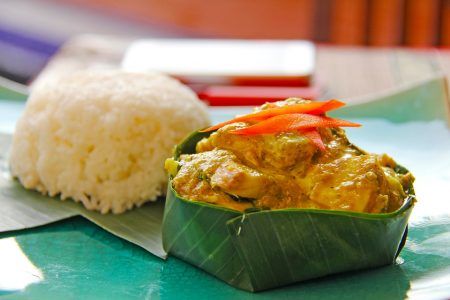
Fish Amok
Unofficially the Cambodian Signature Dish, much like the “adobo” of the Philippines or “paella” of Valencia, Spain. It is diced freshwater fish straight out of the Mekong River and cooked in coconut milk, eggs, fish sauce, and spices. It is steamed in a square formed banana leaf.
Kuy Teav
More popularly known as Mi Soup, Kuy Teav generally a breakfast dish. Simply put, it’s a noodle with soup dish with vegetables. Kuy teav is made of vermicelli noodles while Mi Soup uses the regular instant noodles.
Loc Lac
Originally a Vietnamese dish, it comes in either pork or beef variety. It tastes a little like a beef stew but has an added sunny-side-up eggs, lettuce, tomato, and white onion slices.
Nom Banh Chok
Also a signature dish, this is being peddled around by women with baskets on a balanced pole on their shoulders. Nom Banh Chok is made from thin rice noodles, vegetables and spices, topped with green fish curry.
Bai Sach Chrouk
Bai Sach Chrouk is BBQ-ed pork or chicken and rice dish available only in the morning. It has an egg cooked sunny-side-up egg or boiled in soy sauce, depending on your preference.
Lort cha
Also known as Mi Cha, this is fried noodles cooked with meat, vegetables, and a fried egg. Lort refers to the short fat noodles, while Mi would mean the instant noodle variety. This noodle dish is available almost all hours of the day, and you can buy them from stalls connected to a motorcycle that has a big skillet. You can watch while they cook food in front of you.
There are other, more exotic dishes, you can find such as sweet and spicy duck feet, tarantulas and scorpions on sticks, balut (boiled fertilized duck egg), Chek Chien (fried banana with black sesame), frogs, crickets and many other local dishes you can also try while you are here.
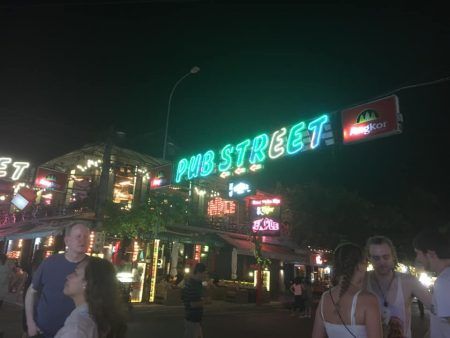
Partying the Khmer Way
As many foreigners would say, Cambodia is the place for partying. There is no end to the number of places you can visit when you want a cold beer, or somewhere to hang-out at the end of a long work day.
Favorite places to go for night entertainment in Phnom Penh would be Riverside Area, Bassac Lane, Russian Market, Street 51 (where a strip of clubs can be found), Street 308, Street 136 for the more adventurous kind, and Street 104.
In Siem Reap, nothing beats Pub Street. It’s where you want to be.
Sending your children to school
Some foreigners travel and stay in Cambodia with their families. Finding an excellent school to send your children for their education is a primary concern.
There are many schools in Cambodia that you can choose from, depending on the kind and quality of education that you want. Here are some of the top international schools you can choose from.
Singapore (Cambodia) International Academy Singapore
SCIA endeavors to be the center of excellence in education and lifelong learning. SCIA is a member of the Singapore Institute of Management (SIM) Group, a leading provider of a diverse range of educational pathways and professional training in Singapore.
Northbridge International School Cambodia
Owned by Nord Anglia Education, Northbridge distinguishes itself from the other international schools being a part of a Global Campus of schools, with 43 other Nord Anglia Schools around the world. The grounds are expansive and green, and the facilities are modern.
iCAN British International School
Centrally located opposite Aeon Mall, iCAN is primary school and middle school focused. ICAN teaches the International Primary Education Curriculum (IPC) and International Middle Year Curriculum (IMYC). ICAN offers a high-quality education with a central location and with slightly lower fees than their larger counterparts.
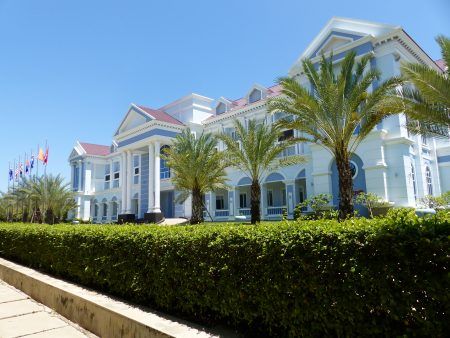
Australian International School Phnom Penh (AISPP)
AISPP offers a modern education within traditional values with a well-rounded education in and out of the classroom. It is modeled on Australian private and independent education standards with a balanced focus on academics, pastoral care, co-curricular options, sporting activities, the arts, and character development, in an international context.
Canadian International School (CIS)
The Canadian International School teaches the Alberta curriculum, and in partnership with the New French International School, teaches a bilingual French/English curriculum.
International School of Phnom Penh (ISPP)
Opened in 1989, ISPP is Cambodia’s first international school. With state of the art facilities and offering the IB curriculum, ISPP holds an excellent reputation amongst the International Schools for teachers and parents alike.
Lycee Francais Rene Descartes (The French School)
While Lycee Descartes offers a Franco-centric education, it is certainly not limited to French expats or French speakers. 70% (40% bi-lingual) of the students are French-speaking. Lycee offers a French Ministry of Education accredited education. It is favored by parents considering relocation to France.
Health and Fitness Activities
After all the delicious food and sinful partying you did, it’s time to cut back to the healthier lifestyle. Siem Reap, Phnom Penh, and Sihanoukville do not have scarcity in terms of healthy activities and food choices.
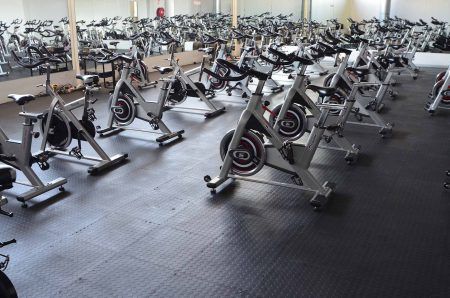
Around the urban areas, gyms and fitness centers are available for every type of budget and health needs. There are pricier options like The Place, Physique Club at Cambodiana Hotel, SuperFit Fitness and Health Club, and CrossFit Amatak. There are also smaller gym places you can find for only $2-$5 per session.
You can also try the Metafit workout sessions at HIIT Fit Phnom Penh, Boxing and Kickboxing classes at Paddy’s Fight Club, Dance classes from Dance World Cambodia and Central School of Ballet Phnom Penh, and yoga classes from Nataraj and Kundalini Yoga Cambodia yoga. Of course, you can also join the Zumba sessions at the Riverside area for a much much lower price.
For sports, rugby or touch football is available at the Phnom Penh Social Rugby Club, Ultimate Frisbee sessions at the Northbridge International School grounds and the Trampoline Park at Fly Phnom Penh.
Support Groups in Phnom Penh and Siem Reap
There are many support groups and FB pages you can find to help you out during your stay in the Kingdom. Some of the more popular groups are Phnom Penh Job Alerts, Phnom Penh Job Posting, Phnom Penh Housing, Phnom Penh Housing, Phnom Penh Buy and Sell Everything, and other Siem Reap FB Groups.
Climate in Cambodia
Cambodia is a tropical country that enjoys two seasons – the northeast monsoon season is from December to April and the dry season is from May to November. The rains, albeit occurring only for an hour at the most, usually comes from September to October.
The temperature is mostly hot from February to April – with the hottest happening on April days. Rain is expected from July to October, but only in short rain showers. The best time to be in the country is from December to January because that is the time when the heat is bearable.
Practicing your Religion
Although the country is predominantly practicing Theravada Buddhism, other religions can freely practice their belief in the country. There are Catholics, Mormon Churches, Anglican Christian, Jewish, Independent Christian, Baptist, Presbyterian and other religious congregation all over Phnom Penh, Siem Reap, Sihanoukville, and the other urban areas.
Starting your life in Cambodia
There are many other aspects of living in another country that you need to learn and understand. However, no amount of preparation and research can fill you in on all the details of your new life. You will only learn everything you need to know when you start living it.
What I do know, from my experience of what life is in Cambodia, it’s new, and it’s exciting. You will have pitfalls, downfalls, and mistakes along the way. But hey, it’s the journey that counts – not the destination.

